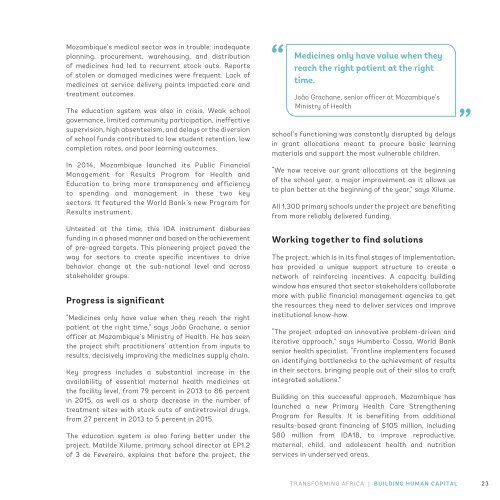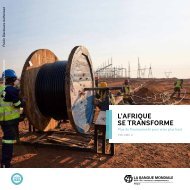Africa Transforming (Vol. 2) : Scaled Up Financing for Scaled Up Ambition
The Africa Transforming series shares stories from Africa that demonstrate the ambitious development agendas that African countries and communities are driving to affect change and inspire others. Development partners are strongly supporting the World Bank Group in matching this ambition. Our financial and technical support is scaling up successful approaches and backing innovative new ones to accelerate progress and catalyze Africa's transformation. Africa Transforming highlights some of the many people, places, and activities making a difference on the ground.
The Africa Transforming series shares stories from Africa that demonstrate the ambitious development agendas that African countries and communities are driving to affect change and inspire others. Development partners are strongly supporting the World Bank Group in matching this ambition. Our financial and technical support is scaling up successful approaches and backing innovative new ones to accelerate progress and catalyze Africa's transformation. Africa Transforming highlights some of the many people, places, and activities making a difference on the ground.
Create successful ePaper yourself
Turn your PDF publications into a flip-book with our unique Google optimized e-Paper software.
Mozambique’s medical sector was in trouble: inadequate<br />
planning, procurement, warehousing, and distribution<br />
of medicines had led to recurrent stock outs. Reports<br />
of stolen or damaged medicines were frequent. Lack of<br />
medicines at service delivery points impacted care and<br />
treatment outcomes.<br />
The education system was also in crisis. Weak school<br />
governance, limited community participation, ineffective<br />
supervision, high absenteeism, and delays or the diversion<br />
of school funds contributed to low student retention, low<br />
completion rates, and poor learning outcomes.<br />
In 2014, Mozambique launched its Public Financial<br />
Management <strong>for</strong> Results Program <strong>for</strong> Health and<br />
Education to bring more transparency and efficiency<br />
to spending and management in these two key<br />
sectors. It featured the World Bank’s new Program <strong>for</strong><br />
Results instrument.<br />
Untested at the time, this IDA instrument disburses<br />
funding in a phased manner and based on the achievement<br />
of pre-agreed targets. This pioneering project paved the<br />
way <strong>for</strong> sectors to create specific incentives to drive<br />
behavior change at the sub-national level and across<br />
stakeholder groups.<br />
Progress is significant<br />
“Medicines only have value when they reach the right<br />
patient at the right time,” says João Grachane, a senior<br />
officer at Mozambique’s Ministry of Health. He has seen<br />
the project shift practitioners’ attention from inputs to<br />
results, decisively improving the medicines supply chain.<br />
Key progress includes a substantial increase in the<br />
availability of essential maternal health medicines at<br />
the facility level, from 79 percent in 2013 to 86 percent<br />
in 2015, as well as a sharp decrease in the number of<br />
treatment sites with stock outs of antiretroviral drugs,<br />
from 27 percent in 2013 to 5 percent in 2015.<br />
The education system is also faring better under the<br />
project. Matilde Xilume, primary school director at EP1.2<br />
of 3 de Fevereiro, explains that be<strong>for</strong>e the project, the<br />
Medicines only have value when they<br />
reach the right patient at the right<br />
time.<br />
João Grachane, senior officer at Mozambique’s<br />
Ministry of Health<br />
school’s functioning was constantly disrupted by delays<br />
in grant allocations meant to procure basic learning<br />
materials and support the most vulnerable children.<br />
“We now receive our grant allocations at the beginning<br />
of the school year, a major improvement as it allows us<br />
to plan better at the beginning of the year,” says Xilume.<br />
All 1,300 primary schools under the project are benefiting<br />
from more reliably delivered funding.<br />
Working together to find solutions<br />
The project, which is in its final stages of implementation,<br />
has provided a unique support structure to create a<br />
network of rein<strong>for</strong>cing incentives. A capacity building<br />
window has ensured that sector stakeholders collaborate<br />
more with public financial management agencies to get<br />
the resources they need to deliver services and improve<br />
institutional know-how.<br />
“The project adopted an innovative problem-driven and<br />
iterative approach,” says Humberto Cossa, World Bank<br />
senior health specialist. “Frontline implementers focused<br />
on identifying bottlenecks to the achievement of results<br />
in their sectors, bringing people out of their silos to craft<br />
integrated solutions.”<br />
Building on this successful approach, Mozambique has<br />
launched a new Primary Health Care Strengthening<br />
Program <strong>for</strong> Results. It is benefiting from additional<br />
results-based grant financing of $105 million, including<br />
$80 million from IDA18, to improve reproductive,<br />
maternal, child, and adolescent health and nutrition<br />
services in underserved areas.<br />
TRANSFORMING AFRICA | BUILDING HUMAN CAPITAL 23



